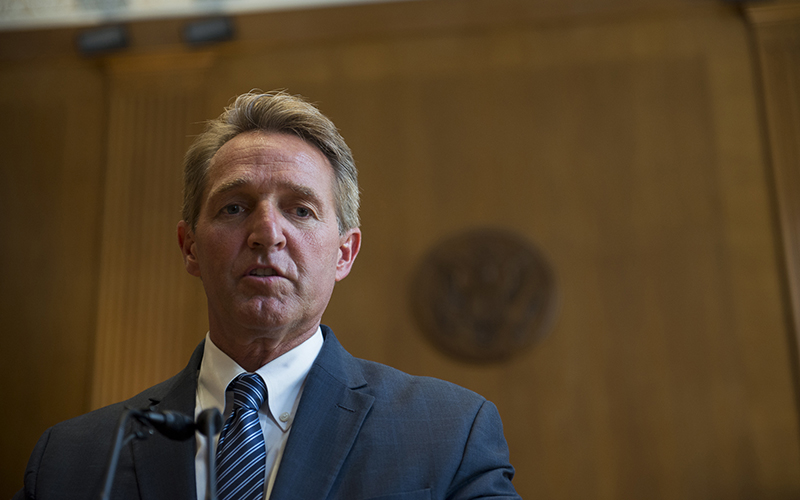
Sen. Jeff Flake, R-Arizona, said his bill to extend DACA protections after benefits expire in March, while also calling for border spending is his attempt to “thread the needle to deliver exactly what the president asked for, what the Congress wants and what my constituents deserve.” (Photo by Ben Moffat/Cronkite News)
WASHINGTON – Sen. Jeff Flake unveiled a proposal Thursday that would extend some protections for DACA recipients in exchange for border security funding and new restrictions on who could be eligible for deferred deportation.
The Arizona Republican’s “Border Security and Deferred Action Recipient Relief Act” joins an increasingly crowded field of bills that aim to replace elements of the Obama-era Deferred Action for Childhood Arrivals program that the Trump administration is dropping March 5.
In a statement on the Senate floor, Flake called his bill “the best way to thread the needle to deliver exactly what the president asked for, what the Congress wants and what my constituents deserve.”
“This bill offers solutions to the serious problems facing us on border security, while at the same time addressing the need for a legislative solution to the issues faced by those children brought here through no fault of their own,” Flake said, according to a release from his office.
Several immigration advocacy groups declined comment on Flake’s bill Thursday, saying they had not had time to study it.
The bill is a response to Trump administration’s decision to phase out the DACA program which currently protects an estimated 800,000 immigrants from deportation.
See related stories:
Under DACA, immigrants who were brought to this country illegally as children were allowed to apply for protection from deportation if they met several criteria, including a clean criminal record, and schooling or military service. The program did not change the immigrant’s citizenship status, but it did grant work authorization to DACA recipients.
Critics said the program, enacted by President Barack Obama through executive order after Congress failed to approve comprehensive immigration reform, was an example of executive overreach. That was the reason cited by Attorney General Jeff Sessions when he announced last month that the program was being revoked.
Immigrants who lose their DACA protection could be subject to deportation – although Department of Homeland Security officials have said they would remain a low priority – and would lose work authorizations.
But in announcing the “wind down” of the program, the administration said it would not start revoking DACA coverage until March 5, to give Congress time to work out a solution.
Flake’s bill is one of several that attempts to do that, from those that would extend and expand DACA protections to others that would include provisions for tighter border control.
Flake’s bill would grant a 10-year extension to DACA recipients who entered the country before 2012 – the year the original DACA program was approved – as long as they were working, enlisted in the military or going to school. At the end of the 10 years, they would be allowed to apply for a green card.
But Flake’s bill also calls for $1.6 billion in additional funding for border security, a provision he said was aimed at garnering Republican support for the bill.
Flake downplayed the size of the security spending outlined in the bill, saying he had effectively “just taken the $1.6 billion that the House already passed” and pinned it to a renewed DACA program.
“It’s something that I think the Democrats could live with,” he said in a conference call on the bill Thursday.
But some Democrats have specifically balked at proposals to tie DACA relief to border security, with Democratic Reps. Raul Grijalva of Tucson and Luis Gutierrez of Illinois threatening to try to hold up the federal budget in December if there is not a vote on a “clean” Dream Act.
Senate Minority Leader Chuck Schumer and House Minority Leader Nancy Pelosi caused a stir last month when they said they had reached agreement with President Donald Trump to “enshrine” DACA protections into law while boosting border security – but without border wall funding. Trump and Republicans quickly challenged the claim that any deal had been reached.
Flake – who is a co-sponsor on the Senate version of the Dream Act – specifically calls for funds dedicated to “74 miles of border fortification,” a plan approved by the House earlier this year in the Make America Secure and Prosperous Appropriations Act. His bill also highlights plans for the construction of additional access roads for Customs and Border Patrol along the southern border.
The bill also narrows eligibility requirement to only those immigrants who were brought here before 2012. Flake deflected questions about immigrants who entered the country after 2012 saying “people are always left out and you do the best you can.”
“You have to make some tradeoffs so I think that’s what will be done here,” Flake said, in response to reporters’ questions. “This is a legislative body where you compromise.”